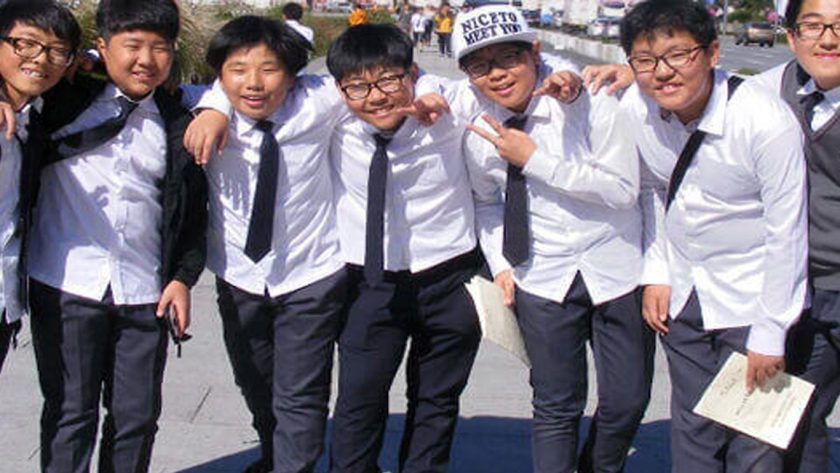I’ve thought long and hard about the best advice I can give to someone about to begin the adventure of teach English abroad in South Korea. I’ve thought about culture, people, customs, and the educational systems. After much reflection, I’ve come up with two things to bring: soft toilet paper, and prizes.
The first is simple. I’m not going to comment further except to say you’ll likely be eating the spiciest food of your lifetime in South Korea. If you use the bathroom sandpaper that the locals think is comfortable, then you’ll likely be sleeping on your stomach for the rest of your life. But the prizes? That has to do with teaching elementary school kids. And teaching-well, it’s considerably more complicated.
I decided to teach in Korea for a couple of reasons. I wanted a Far East adventure, and it was a lot easier to get a job in Korea than in Japan. No programs, no waiting, no certifications. Just jobs, and plenty of them. Another thing was the money, around $2,000 per month, which was pretty decent, especially compared to other countries in Asia, where teachers may make less than a quarter of that. Finally, based on my experience with my nieces and nephews, I’d always thought that I had a gift with kids and would be a good teacher. Korea was a way to try it out.
So I read through the hordes of ads for English teachers needed in Korea. They all came with the basics: a free plane ticket to the “Land of the Morning Calm,” paid housing, and a good salary. The qualifications? “Requires B.A. degree. No experience necessary.” The Peter Rabbit Kindergarten Class
On my first teaching day in Korea, I walked into my classroom (the “Peter Rabbit” class) with my Korean supervisor, Jean. These were all kids. I asked Jean about the young adults and adults I thought I was supposed to be teaching. She said some third-graders were coming in the afternoon and that our private school was thinking about starting an adult program next year. In the meantime, here was my kindergarten class.
She gave me a halting introduction to the kindergarteners. They eyed me suspiciously. She prepared to leave . . . and leave me alone with the kids. I quickly caught her at the door. I asked her where my predecessor was, the one who was supposed to be training me. She grimly told me that the woman, a former principal, had left and refused to teach this class anymore. She pointed to a worn-out set of books by my desk. She put her hand on the doorknob.
“But,” I said confused, “what about my training?”
Jean nodded seriously. She hung her head for a beat. At the time, I assumed this meant she was coming up with a solution. Now I think she was just resting her chin. She looked up and pointed into the classroom.
“Okay, good,” she said quickly. “You teach them English now.”
Then she closed the door on me and the kindergarteners. I eyed them warily. They eyed me warily. Truth was one big fatality in this school. I looked at the scabby-cheeked residents of the class. They smiled. Apparently, I was the next fatality in line.
Over the next two weeks, I tried in vain to follow the page-missing, dog-eared, disorganized mess that made up the collection of manuals for teaching English as a foreign language. In between I acted as warden to a gang of six-year-olds predisposed to drooling, hitting and eating clay. Kids who thought it was funny to yank out my arm hair in order to understand the word fuzzy. A lot of Korean kids this age are running wild. Children are often spoiled at a young age because, from mid-elementary school on, they’ll be in the educational equivalent of a chain gang. Kids usually go to two schools per day, get home at eight on weeknights, and have anywhere from four to six hours of homework. Weekends are Saturday classes and a Sunday of studying. All told, from age six to eighteen, these kids are sleep-deprived, overworked, and pathologically afraid of textbooks. On an ideological level, I appreciated that this was their last year of freedom before the Korean educational lockdown. On a practical level, I spent my morning screaming, cleaning, and wishing that the kids who knew martial arts would stop trying to kill the kids who didn’t.
After nearly three weeks I knew that I was in over my head. At that point, Jean, my supervisor, came by to ask me how I was doing. I told her. In great detail. One student had anger-management issues, one was more emotional than an Oprah audience, one was a genius who should be in a higher class, one had either narcolepsy or a mild learning disability, and one was going to grow up with a Travis Bickle complex. I didn’t know who Korea’s president would be in twenty years, but someone needed to give him a picture of this kid to look out for.
She replied, “Yeah. Okay. Good. You teach them now,” and walked off. That’s when I figured out management wasn’t big on noticing problems with kids. If one of them had an axe sticking out of his head, I think my bosses would see it as a bactine issue. This is where I learned the best and worst thing about teaching in Korea: it’s mainly up to you.
Korean Kindergarten Game Show
Most private schools in Korea (the ones with all the jobs) will hire whatever native speaker with a degree they can get in the door. There’s not going to be a lot of training or help or support-ust a bunch of kids who need to learn English, and it’s all up to you, but the schools don’t care how you do it. Once I figured that last part out, my life as a teacher got a lot easier.
After failing to turn things around with the remains of a teacher’s manual, I decided I had nothing to lose by just trying something stupid. As far as I was concerned, a bold stupid move had gotten me into this mess; another one might get me out. Enter the Korean Kindergarten Game Show. I called it the “Star System.” I put all of their names on the board. They got a star when they pushed in their chairs, remembered to put crayons back, or gave a good answer in English to a question. Notice I didn’t say correct answer. Part of my goal structure was to get one of my kids, James, to stop saying “elephant” every time he woke up from naptime. I mean, it’s only funny the first ten times.
The flipside was losing stars. Lest you think I’m cruel, no one lost any stars for giving the wrong answer, only if they gave the same wrong answer someone else just tried. Additionally, the kids also lost stars for the following: picking their noses, hitting, talking in Korean, calling out, stealing, spilling, cursing at each other in Korean, tattling, crying, asking for food they couldn’t eat, cursing me in Korean, sleeping, putting their feet on the desk, and, in the case of Mark, putting their nose on the water fountain spigot. In fairness, I probably should have explained the phrase, “wash your face.”
The class turnaround was immediate. General behavior became better, the class became quieter, and the amount of crying went way down. Even the other teachers, with their fancy “education” degrees, were downright amazed. I started to consider myself an educational pioneer, right up there with the guys who invented Show and Tell, raising hands, and sweet-flavored paste. At least, until one of my kids, Josh, asked a question.
“Teacher,” Josh said puzzled, “number one stars . . . what?”
That’s when I said, almost without thinking, “Number one stars? Um . . . prize.” The class went all goggle-eyed and started a mumble of “oh, yeahs.” Then Josh smiled and leaned back in his chair and said the clearest word of the day. “Prize,” he said, contentedly.
And this brings us to the only other good advice I can offer about teaching in Korea: Bring prizes. Because one trip to the toy aisle of the dollar store now will save you a heck of a lot of trouble later. It’s kind of amazing the way the whole thing snowballed. On Fridays, I would make a big show of presenting the Number One stars prize, usually some Digimon knockoff. For four and a half days, the Peter Rabbit class was well-behaved. Then, on Friday, one student would enjoy the fruits of his good work and celebrate. For the rest? Huge amounts of crying.
After a month of Friday meltdowns, I introduced a second-place prize. The result was that now the number three kid was asking why he didn’t get anything. I tried to counter the defeatism. I began making small awards to the rest of the class and tagging random attributes to them. “Jon, best penmanship. Sherry, best art. Mark . . . good energy.” It was pretty pathetic. The class picked up on it. So I tried something new. The new format changed came weekly, with special prize rounds, Friday eliminations, and mystery prizes. At one point, I stole the spinner wheel from Chutes & Ladders and introduced a star roulette round. I yanked it when it morphed into straight roulette with jelly beans instead of money. Game show for children? Debatable. Kiddie casino? Very bad.
Eventually, when everyone in the class got ten stars, everyone got a prize. In theory, if everyone got ten stars Monday through Friday, I would have had to shell out for gifts everyday. Thank God I had a class of hellions.
In the end, the parents were happy, the kids learned, and I lost a very large chunk of my salary because I’m a sap. But for better or worse, it’s the kind of teacher I was, and Korea is one of the few places in the world I could have had the chance to try it. In black and white, I paid cash money for improvements in my own class. Bribery, however, did work as a useful educational tool. Before my crazy experiment, you couldn’t understand a word my kids said. Today, months later, the administrators still complain my kids won’t shut up. They say whatever’s in their heads, even if what’s in their heads is “Principal is old” or “Mark is fat” or “New teacher is hairy like a monkey.”
Then there’s what the game show did for our class phonics level, our spelling, and even our morale. Fact is, you can’t be lazy and earn stars. So we colored like Matisse, we answered with feeling, and no one wanted to play dodgeball with us. We’d out and out kill you. When I left them, my class had a undefeated record in schoolwide singing/chanting competitions. Last time we got medals for “I Feel Good” by James Brown and “Iko Iko” by the Dixie Cups.
Teacher! I Love You
Today, I’m no longer a teacher. I’m back in the U.S. and my job is in no way related to education. Some days, given how little anything else in Korea made sense while I was there, I wonder about the teaching, which was one of the few things that did. And usually, when I’m remembering, I get a letter from Josh. I got this one yesterday.
HI! TEACHER I AM CRYING NOW. BECAUSE I MISS YOU. YESTERDAY I RECEIVE VIDIO FROM WONDERLAND. SO I WACHED THE VIDIO. OF COURSE I SAW YOU. SO MORE I MISS YOU. SO GOING DOWN EYEWATERING ON MY CHEEK. MOM SAID “DON’T CRY SOON YOU CAN SEE RILEY ” BUT I AM SAD. TEACHER! I LOVE YOU. BYE
Josh was a first-class bully when I got him. If it didn’t involve lunch or punching, he wasn’t interested. Today, he reads an English book every day and e-mails me at least once a week. It’s not long or always clear. It’s not close to perfect. But he writes it. In a language that’s not his. He’s six years old. I save every letter.
Korea wasn’t what I was expecting. Frankly I don’t see how I could’ve prepared for it. It’s frenzied and orderless, and three days out of four, I thought the trucks were aiming for me. But after you get used to it, living in a country with a safety sense like Wile E. Coyote is more stimulating than an ephedrine snow-cone. And when it came to teaching, I think it was just what I needed. I’ve left a legacy with my kids that will make them more clever, more talkative, and better equipped to make the $250,000 level on Who Wants to Be a Millionaire. Teachers come and go. Getting past the fast-finger round is something they’ll remember for the rest of their lives. Hopefully, they’ll forget the part about me applying standards randomly, whacking them on the head with markers, and yelling like a drill sergeant. Ah, still, if they end up in front of Regis, they’re gonna need to know that anyway.
So should you go? If you’re the right kind of person. If you crave order and calm and deep spiritual discovery, you might want to keep looking. But if you like action and energy and disorder, you’ll do fine. Make it up as you go along. You’ll do great. But don’t forget that toilet paper. Or you’ll be making it standing up.
Questions to ask your possible employer (and fellow teachers):
Can I talk to some of the teachers?
How many teachers finish out their contracts?
Is the school in a major city?
Do you pay at least 2 million won per month? Do you pay in U.S. or Korean currency?
Do you have any single housing or do you have to have roommates?
Is there any flexible vacation time or is it just during the two Korean holiday periods?
Do you mandate any kinds of weekend work or training days? How many?
Does the housing come with an air conditioner?
Do you offer a one–month bonus for completing a one–year contract? (All schools should.)
Are all the contracts one year, or do you offer six–month contracts?
When You’ve Found a Good School
Spend a full week doing some aggressive job-hunting, and you should come across a school with teachers you like, an owner who isn’t too corrupt, and a list of demands. The school owner will then say he can’t do any of it. That brings us to your single best, most effective, negotiating tool: bluffing. Very politely say the following: “Oh, that’s too bad. Another school in Pusan has offered me (insert what you want here), and I have to call them back.” Then hang up. The odds are 50/50 that within five minutes you’ll get a call back with a guarantee for everything from the school that just told you it was impossible. If not, apply to teach English at some more of the hundreds of jobs out there and repeat the process till you get what you want. And then get it all in writing in your contract before you sign anything.


